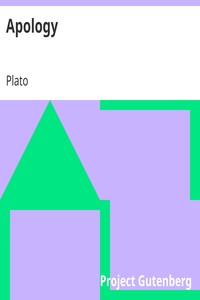Apology by Plato
"Apology" by Plato is a philosophical dialogue that serves as a defense of Socrates, one of history's most influential thinkers, written during the classical period of Ancient Greece. The book encapsulates Socrates’ trial for impiety and corrupting the youth, exploring themes of morality, knowledge, and the essence of justice. Through Socrates’ eloquent defense, Plato conveys not only the ideas of his mentor but also critiques the Athenian society that condemned him. In
"Apology," Socrates stands before a jury in Athens, addressing the accusations against him with steadfastness and irony. He refutes claims of corrupting the youth, arguing that he encourages critical thinking and self-examination, rather than traditional teachings. Socrates highlights the wisdom in recognizing one’s own ignorance, aligning himself with the prophetic declaration of the Delphic oracle that he is the wisest man for knowing he knows nothing. Throughout his defense, he advocates for moral integrity over fear of death, ultimately accepting the consequences of his unwavering commitment to philosophy and virtue. The dialogue culminates in a powerful assertion that no evil can befall a good man, framing death as potentially the greatest opportunity for enlightenment and truth. (This is an automatically generated summary.)
Read or download for free
| How to read | Url | Size | |||
|---|---|---|---|---|---|
| Read now! | https://www.gutenberg.org/ebooks/1656.html.images | 112 kB | |||
| EPUB3 (E-readers incl. Send-to-Kindle) | https://www.gutenberg.org/ebooks/1656.epub3.images | 93 kB | |||
| EPUB (older E-readers) | https://www.gutenberg.org/ebooks/1656.epub.images | 92 kB | |||
| Kindle | https://www.gutenberg.org/ebooks/1656.kf8.images | 152 kB | |||
| older Kindles | https://www.gutenberg.org/ebooks/1656.kindle.images | 144 kB | |||
| Plain Text UTF-8 | https://www.gutenberg.org/ebooks/1656.txt.utf-8 | 105 kB | |||
| Download HTML (zip) | https://www.gutenberg.org/cache/epub/1656/pg1656-h.zip | 88 kB | |||
| There may be more files related to this item. | |||||
Similar Books
About this eBook
| Author | Plato, 428? BCE-348? BCE |
|---|---|
| Translator | Jowett, Benjamin, 1817-1893 |
| Title | Apology |
| Note | Reading ease score: 68.5 (8th & 9th grade). Neither easy nor difficult to read. |
| Note | Wikipedia page about this book: https://en.wikipedia.org/wiki/Apology_(Plato) |
| Note | Death of Socrates 1 |
| Credits | Produced by Sue Asscher, and David Widger |
| Language | English |
| LoC Class | B: Philosophy, Psychology, Religion |
| LoC Class | PA: Language and Literatures: Classical Languages and Literature |
| Subject | Classical literature |
| Subject | Socrates, 470 BC-399 BC |
| Subject | Philosophy, Ancient |
| Category | Text |
| EBook-No. | 1656 |
| Release Date | Feb 1, 1999 |
| Most Recently Updated | Oct 4, 2020 |
| Copyright Status | Public domain in the USA. |
| Downloads | 3026 downloads in the last 30 days. |
| Project Gutenberg eBooks are always free! | |


